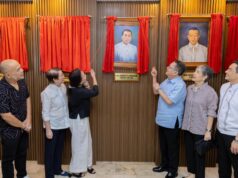(BSP’s Rosario Layug shows features of a real P1,000 bill. Photo by Bong Lacson)
CLARK FREEPORT – An executive of the Bangko Sentral ng Pilipinas (BSP) has reiterated its mandate and urged the public to familiarize themselves with the security features of Philippine banknotes.
During the “Talk Widus” media forum organized by the Pampanga Press Club in cooperation with the Widus Hotel and Casino here on Wednesday, BSP deputy director Rosario Layug said their mandate is currency management.
“Our mandate is currency management. We cover banknotes and coins and we service withdrawal of the public and we also accept their deposits,” she said. “We deal with commercial banks because individuals go to these banks which then make a deposit with the BSP.”
Layug, who has been at her post for a year, heads the BSP branch located at Greenfi elds, Sindalan in the City of San Fernando, covering the provinces of Tarlac, Zambales, Bataan, and Pampanga.
She said the BSP has three regional offices and 18 branches all over the country.
Layug stressed the importance of raising awareness in identifying genuine “piso bills” by familiarizing with their security features.
She said there are several security features found in genuine banknotes that the public should know to avoid being deceived. Among these are watermark on the blank area of the money, and security threads that appear stitch-like and metallic.
She also said the texture of the real piso bills is also diff erent because it has embossed print like the “Republic of the Philippines” on the banknote, unlike fake bills which have smooth texture.
The serial numbers also appear in variable sizes, the see-through mark has Pilipino spelled in Baybayin letters and have concealed values.
The 500 and 1,000 piso bills also have additional security features like the optically variable devices.
Layug explained that “banks have a certain requirement from the BSP to comply with, like they have to meet the reserve requirement being required by the BSP and part of this is in the form of due from BSP.”
She added that banks have to maintain their insurance at a certain level.
She also explained the “cash cycle” which starts with forecasting: “A certain department in the BSP forecast how much money will be produced based on what is the need of the economy.”
Layug explained that “such department has different tools that they apply to come up with the figures so that department, the Department of Economic Research, will compute the need of the economy based on statistical tools and they will inform our sector, the Currency Management Sector (CMS), on what is the requirement of the economy in notes and coins.”
For the breakdown of the currency needs, the CMS also has a division that computes how much will be produced in different denominations, she added.
Layug said banknotes are of two kinds, the fit and unfit or mutilated. “We will verify if fit and they will be reissued to the public,” she said observing that banks prefer new notes especially during the Christmas season.
But she said sometimes banks prefer reissued banknotes because new notes tend to stick together especially on ATMs.
Layug said the unfit banknotes will be “retired or shredded.”
She said three separate departments handle the production of banknotes. “One is the BSPD (Bangko Sentral Securities and Printing Department) for the notes and the MROD or the Mint and Refinery Operations Department) for the minting of coins and the BSPMD since some of our notes are out sourced we get them from external suppliers.”
However, she said, the BSP has already purchased machines “so that we can become self-sufficient.”
Layug said unfit or mutilated banknotes should be at least 60 percent intact to be qualified for exchange to new ones and at least one of the signatories in the banknote should remain.
She said it is a criminal act to destroy money covered by Presidential Decree 247, adding that the BSP has a “Clean Note Policy” which means that unfit or mutilated money should be exchanged.
“All banks should not refuse to exchange money,” she noted.





